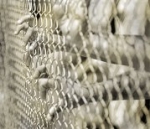OTTAWA — Three men suspected of ties to al-Qaeda and held in a maximum-security prison in Kingston have access to cable TV, a microwave oven and fitness equipment, a confidential draft study leaked to The Globe and Mail says.
The document, prepared by the House committee on immigration, provides an in-depth look at the controversial prison unit, which human-rights activists have dubbed Guantanamo North.
While the picture painted by members of Parliament is a far cry from the harsh conditions at the U.S. military prison in Guantanamo Bay, Cuba, the draft study also mentions claims of beatings and humiliation.
The study, to be presented to the House of Commons in its revised version, comes at a time when the three terror suspects are staging a hunger strike to protest against their conditions. They complain about mistreatment by the guards and poor medical care.
"Detainees are entitled to have a 13-inch TV in their cells, and the [prison] is responsible for paying the costs of the cable," the MPs wrote in their draft study.
The three men have access to a washer and dryer. They can walk in a concrete yard and exercise in a nearby trailer with fitness machines. They can spend time with each other in a common room.
And they can talk on the phone for one hour with their family, and for an unlimited period of time with their lawyers.
Until about three months ago, when they initiated a hunger strike, a registered dietician was planning the detainees' meals. Now they are only drinking water, juice and, occasionally, clear broth.
The draft study also states medical facilities are available on site and that a nurse is to check on the men daily during hunger strikes.
The three men want a bigger yard and some grass in it, the study says. They also complain the chairs in the common room are uncomfortable and that the powerful security lights shine into their cells at night.
They have requested access to a correctional investigator to complain about ill-treatment by the guards.
Officials have already granted some of their requests, the study says. For instance, the detainees, all Muslim, can now see their families in the presence of a woman guard, which enables the wives to remove their veils during the visit.
Despite some improvements, the men insist that their conditions remain deplorable. In a memo to MPs, which was reproduced partly in the draft study, they describe their living quarters as a "small portable unit, which creaks with every movement. All night, whenever one person rolls over, we all hear it."
The draft study also quotes allegation of abuse, though it does not substantiate the claims. "We also have endured humiliation, tauntings, beatings, and threats because of the terrorism label," the detainees wrote in the memo quoted by the MPs.
Yesterday, the same House committee that wrote the draft study decided not to question the five guards alleged to have abused the detainees.
Some of the opposition MPs on the committee said they were not interested in hearing the "nitty-gritty" details of the alleged abuses.
"The committee is not a court," said Omar Alghabra, the Liberal immigration critic, who voted against the motion brought forward by his colleague, Jim Karygiannis, Liberal MP for Scarborough-Agincourt. "We have to be careful not to let those things drag [us] into nitty-gritty details."
Bloc Québécois MP Meili Faille shares Mr. Alghabra's opinion. "The information we have in front of us is sufficiently credible," Ms. Faille said of the interviews with guards and detainees.
Ms. Faille stopped short of saying whether detainees had suffered ill-treatment. But she noted that the guards' habit of observing and making notes on the men's most minute movements could be perceived as abusive.
POSTED BY/http://www.homestead.com/




















The comments are closed.